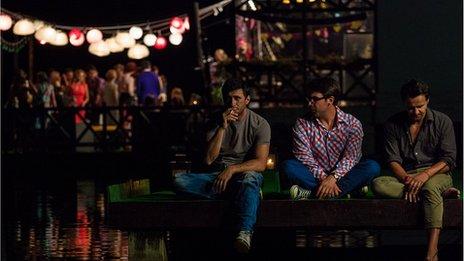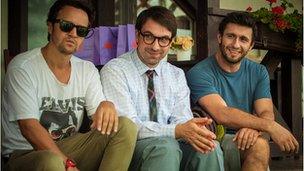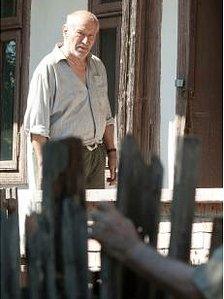Romanian film enters a new era
- Published

Love Building is the most successful independent film ever released in Romania
Child's Pose - The Golden Bear-winning Romanian drama is released in UK cinemas this weekend. While it was the winner at the Berlin film festival Alison Frank found a wealth of Romanian films were riding high at the recent Warsaw film festival. Is this the start of a new era for Romanian film?
The Romanian New Wave was declared several years ago, as The Death of Mr Lazarescu (2005) and 4 Months, 3 Weeks and 2 Days (2007) triumphed at international film festivals, opening doors to subsequent Romanian films such as California Dreamin' and Tales from the Golden Age.
All waves eventually break, but those who sounded the end of Romania's may have spoken too soon.
At the recent Warsaw Film Festival Romania tied with Poland for the largest number of films in competition with four, coming just behind the Czech Republic.
While none of the five Czech films won any awards, Romania secured one prize and a statement of appreciation.
Romania's dominance in Warsaw was more than a matter of quantity. Romanian debuts such as Love Building and Little Spartan demonstrated originality where other first-time directors offered a pale imitation of cinema's masters.
Against a background of films filled with cruel individuals and empty violence, the Romanian directors' better-developed characters, playful sense of humour and thought-through conclusions were refreshing.
The Romanian films had their share of death, illness, loneliness and betrayal, but offered closure as they typically found a witty, sometimes absurd way to deal with life's imperfections, compromises and disappointments.
Broad appeal
Romanian comedy Love Building got a standing ovation at its first Warsaw festival screening but also received special praise from the critics' jury.

Love Building stars Dragos Bucur, Alexandru Papdopol and Dorian Boguta.
First-time feature director Iulia Rugina has been surprised at the broad appeal of her low-budget comedy, which had a successful Romanian box office run before making its international premiere in Warsaw.
"Love Building was very well received in Romania by the audience. That was important because it is rare. There is a very big group of population who refuses to go watch Romanian films and makes a statement about this," Rugina explains.
As to critical favour, Rugina says: "I know it is not often that audience-friendly films are critically acclaimed. And the other way round. That is why to have both is unexpected."
Love Building is the story of three relationship therapists who set up a week-long couples' retreat in the countryside. Yet most of the comedy comes from the therapists' own, much bigger, relationship issues.
If there's one problem with Love Building, it's that there are too many characters: it's hard for audiences to keep track of some 14 couples, and even harder for an 85-minute film to give all of them sufficient screen time.
But the film's very existence depends on its crowded cast list. Every year, professional actors Dragos Bucur, Alexandru Papdopol and Dorian Boguta (who play the film's therapists) run a summer acting school, which normally ends with the making of a short film.
Last year, Iulia Rugina suggested that they try to make a full-length film instead. Where filmmakers normally decide on the script first and select their cast second, here the process was reversed.

The Japanese Dog stars Victor Rebengiuc, in the lead role
Faced with a large group of mainly non-professional actors, Rugina had to come up with a story set in countryside with enough roles for all the students.
One of the most common questions from audiences is why there are two lesbian couples in the film, but no gay couples: it's because more women than men took part in the acting school that year, Rugina explains.
The most successful Romanian film in Warsaw was The Japanese Dog, directed by Tudor Cristian Jurgiu. It won the 1-2 Competition for directors making their first or second feature.
The film revolves around an elderly man who lost his wife, home, and most of his belongings in a flood, and is estranged from his only son who moved abroad years ago.
Unexpectedly, his son comes to visit with his Japanese wife and seven-year-old son. Grandfather and grandson immediately bond over photo albums and a toy - the robotic Japanese dog of the film's title.
There is little dramatic tension, and the dog feels like a bit of a gimmick, but the film nonetheless offers a beautiful and sensitive portrait of the Romanian countryside, of cross-cultural and cross-generational bonding, and directs attention towards the increasingly common and devastating problem of flooding.
Bizarre hybrid
While The Japanese Dog was to some degree typical festival fare, Little Spartan was a film that many critics were at a loss to describe. Sure enough, it is a bizarre hybrid of a film in every respect.
Billed as a mockumentary, Little Spartan is the result of a collaboration between first-time feature director Dragos Iuga and Gabriel Dita, an engineer who suffers from a lack of growth hormone receptor in the pituitary gland.
Making use of interviews, mobile phone footage, surveillance cameras, home videos and even fantasy, Iuga shot the film over the course of 17 years, exploring various aspects of the life of Dita, nicknamed Little Spartan.
Endlessly surprising and full of eclectic elements, the film might be dismissed as just another pseudo-documentary, albeit an odd one, if it weren't for the vein of the fantastic snaking through the film.

Romanian film Child's Pose won the Golden Bear at the Berlin film festival for director Calin Peter Netzer
This is a daring addition and sure enough, the fantasy element in Little Spartan knocks it off balance, yet such is its whimsy and magic, it is hard not to be charmed.
In his uncle's workshop, Dita and his brother as children look on while the carpenter makes whimsical wooden lamps that mysteriously power themselves. While it did not win any awards, Little Spartan was aptly placed in the festival's Free Spirit category for its uninhibited and experimental approach.
The Romanian New Wave in its early days was marked by social realism and a clear-eyed approach to both its Communist past and its neo-liberal future. According to this definition, The Japanese Dog fits most clearly into the New Wave lineage, while Love Building corresponds partially as a satire of the new aspirational middle classes.
But could the more eclectic approach of Little Spartan and the popularity of Love Building's comedy mark a new stage in the evolution of Romanian cinema? Iulia Rugina thinks so.
"The Romanian New Wave is still high up, but I am not able to predict what will happen next...there might be an alternative type of films coming out - a lighter type of cinema, more glossy, more audience-friendly, a little distant from the Romanian realism that international festivals have got used to."
International audiences came to know Romania's cinema through stark realism; the coming years may be marked by a more popular, but no less fresh and innovative Romanian New Wave, embraced both at home and abroad.
UK audiences will get a chance to experience a selection of these films at the 10th Romanian Film Festival in London that starts 28 November. The festival is entitled Turning the Page, indicating how the films on show look forward beyond the New Wave in terms of content, social analysis and storytelling.
"The windows have been thrown open! We're turning the page!" is the festival's tagline.
- Published21 October 2013
- Published16 February 2013